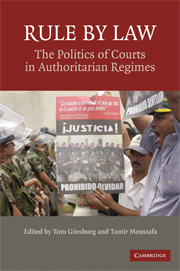Book contents
- Frontmatter
- Contents
- Contributors
- Introduction: The Functions of Courts in Authoritarian Politics
- 1 Of Judges and Generals: Security Courts under Authoritarian Regimes in Argentina, Brazil, and Chile
- 2 Administrative Law and the Judicial Control of Agents in Authoritarian Regimes
- 3 Singapore: The Exception That Proves Rules Matter
- 4 Agents of Anti-Politics: Courts in Pinochet's Chile
- 5 Law and Resistance in Authoritarian States: The Judicialization of Politics in Egypt
- 6 Courts Out of Context: Authoritarian Sources of Judicial Failure in Chile (1973–1990) and Argentina (1976–1983)
- 7 Enforcing the Autocratic Political Order and the Role of Courts: The Case of Mexico
- 8 The Institutional Diffusion of Courts in China: Evidence from Survey Data
- 9 Building Judicial Independence in Semi-Democracies: Uganda and Zimbabwe
- 10 Judicial Power in Authoritarian States: The Russian Experience
- 11 Courts in Semi-Democratic/Authoritarian Regimes: The Judicialization of Turkish (and Iranian) Politics
- 12 Judicial Systems and Economic Development
- 13 Courts in Authoritarian Regimes
- References
- Index
6 - Courts Out of Context: Authoritarian Sources of Judicial Failure in Chile (1973–1990) and Argentina (1976–1983)
Published online by Cambridge University Press: 05 June 2012
- Frontmatter
- Contents
- Contributors
- Introduction: The Functions of Courts in Authoritarian Politics
- 1 Of Judges and Generals: Security Courts under Authoritarian Regimes in Argentina, Brazil, and Chile
- 2 Administrative Law and the Judicial Control of Agents in Authoritarian Regimes
- 3 Singapore: The Exception That Proves Rules Matter
- 4 Agents of Anti-Politics: Courts in Pinochet's Chile
- 5 Law and Resistance in Authoritarian States: The Judicialization of Politics in Egypt
- 6 Courts Out of Context: Authoritarian Sources of Judicial Failure in Chile (1973–1990) and Argentina (1976–1983)
- 7 Enforcing the Autocratic Political Order and the Role of Courts: The Case of Mexico
- 8 The Institutional Diffusion of Courts in China: Evidence from Survey Data
- 9 Building Judicial Independence in Semi-Democracies: Uganda and Zimbabwe
- 10 Judicial Power in Authoritarian States: The Russian Experience
- 11 Courts in Semi-Democratic/Authoritarian Regimes: The Judicialization of Turkish (and Iranian) Politics
- 12 Judicial Systems and Economic Development
- 13 Courts in Authoritarian Regimes
- References
- Index
Summary
INTRODUCTION
The purpose of this chapter is to investigate how military dictatorships that concentrate formerly separated and shared powers affect the activity of regular courts that survive from a prior, formally constitutional regime0. Specifically, I explore two dictatorships, the Argentine (1976–1983) and the Chilean (1973–1990), to examine whether courts can conceivably uphold rights and liberties, as warranted by the constitutional definition of their powers, out of context; that is, once dictatorship has displaced the regular constitutional-institutional framework. This study thus points to the limits on courts in authoritarian regimes and to the limits of what might be called “partial constitutionalism” – the idea that a judiciary, as structured by a given constitution, ought to uphold and defend another part of the constitution, its guarantees of rights, even after the core institutions of that constitution – elected legislative and executive institutions – have been suppressed and displaced by an autocratic centralization of power.
This formulation may appear peculiar, but it is noteworthy that such expectations regarding the potentialities of courts in authoritarian regimes are implicit in many critical accounts of the judiciary under dictatorship. Such expectations are even to be found in the final official reports issued by the truth commissions formed in the aftermath of military rule to clarify the worst violations of rights in Argentina and Chile, the Comisión Nacional sobre la Desaparición de Personas (hereafter CONADEP) and the Comisión Nacional de Verdad y Reconciliación's (hereafter Comisión Rettig), respectively.
- Type
- Chapter
- Information
- Rule by LawThe Politics of Courts in Authoritarian Regimes, pp. 156 - 179Publisher: Cambridge University PressPrint publication year: 2008
- 8
- Cited by

